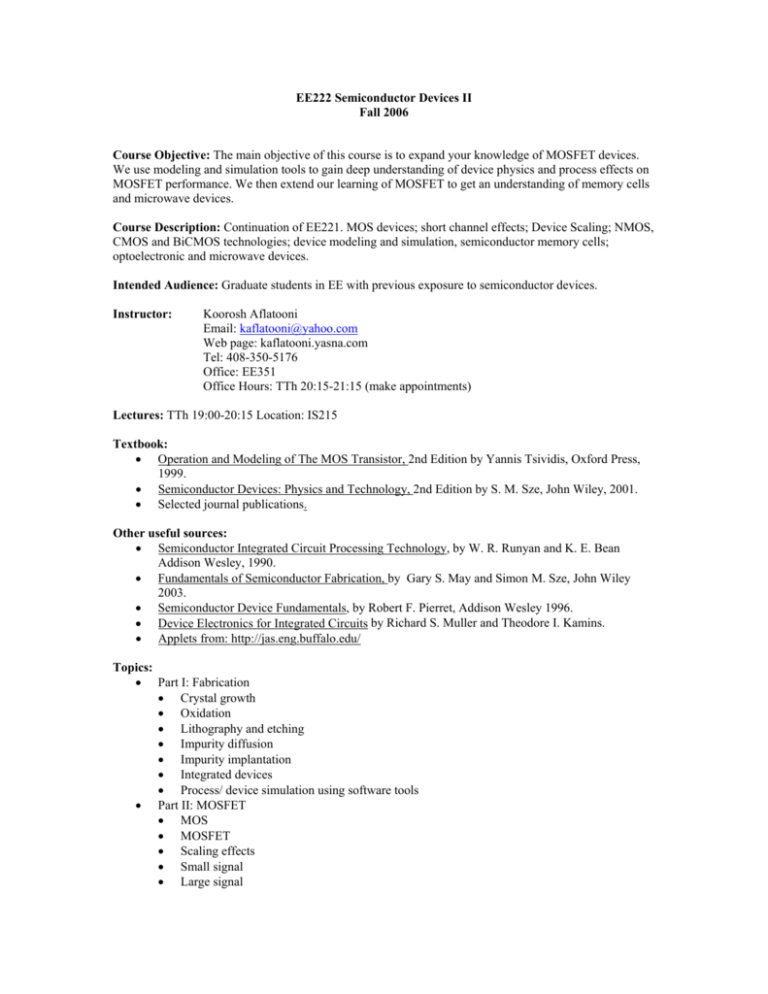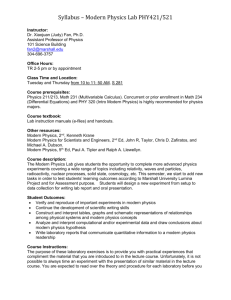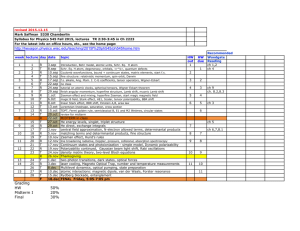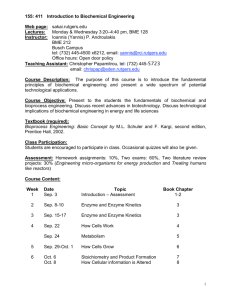Syllabus - Electrical Engineering
advertisement

EE222 Semiconductor Devices II Fall 2006 Course Objective: The main objective of this course is to expand your knowledge of MOSFET devices. We use modeling and simulation tools to gain deep understanding of device physics and process effects on MOSFET performance. We then extend our learning of MOSFET to get an understanding of memory cells and microwave devices. Course Description: Continuation of EE221. MOS devices; short channel effects; Device Scaling; NMOS, CMOS and BiCMOS technologies; device modeling and simulation, semiconductor memory cells; optoelectronic and microwave devices. Intended Audience: Graduate students in EE with previous exposure to semiconductor devices. Instructor: Koorosh Aflatooni Email: kaflatooni@yahoo.com Web page: kaflatooni.yasna.com Tel: 408-350-5176 Office: EE351 Office Hours: TTh 20:15-21:15 (make appointments) Lectures: TTh 19:00-20:15 Location: IS215 Textbook: • Operation and Modeling of The MOS Transistor, 2nd Edition by Yannis Tsividis, Oxford Press, 1999. • Semiconductor Devices: Physics and Technology, 2nd Edition by S. M. Sze, John Wiley, 2001. • Selected journal publications. Other useful sources: • Semiconductor Integrated Circuit Processing Technology, by W. R. Runyan and K. E. Bean Addison Wesley, 1990. • Fundamentals of Semiconductor Fabrication, by Gary S. May and Simon M. Sze, John Wiley 2003. • Semiconductor Device Fundamentals, by Robert F. Pierret, Addison Wesley 1996. • Device Electronics for Integrated Circuits by Richard S. Muller and Theodore I. Kamins. • Applets from: http://jas.eng.buffalo.edu/ Topics: • Part I: Fabrication • Crystal growth • Oxidation • Lithography and etching • Impurity diffusion • Impurity implantation • Integrated devices • Process/ device simulation using software tools • Part II: MOSFET • MOS • MOSFET • Scaling effects • Small signal • Large signal • • High frequency • MOSFET modeling Part III: Other devices (e.g. memory cells) Prerequisites: EE221 Homework: Homework assignments will be recommended at the end of each section represent a minimum number of suggested practice problems for the students to solve to test their understanding of the material covered in lecture. Even though homework will not be picked up or graded, they should be treated as an invaluable learning tool to get a good grasp of the material covered in this course. Lab Simulation Assignments: A number of problems will be assigned to be investigated using simulation tools. Exams: There will be 1 examination in addition to the final comprehensive examination. The approximate dates of these examinations are shown on the course calendar. All exams will be closed-book except for 2 sheets (standard 8.5”x11”, both side may be used) of notes, formulas, etc., that students will be allowed to bring at test time. There will be no make up exams. Any student who fails to take an examination will receive a letter grade "F" for that particular examination. Project: This course involves a detail project; the topic of the project can be selected from suggested topics or desired topics (in case of desired topic, the new topic need to be approved by instructor). The project requires some literature search, analyzing existing data, and simulation. You will present the results of your work to rest of class during a 20 minutes presentation and 5 minutes Q/A session. You need to submit the selected topic to instructor by October 3rd . Two reports are required: a preliminary report on status of literature survey by October 26th , and final report including the results of your simulation by final exam. The project grade will be based on these criteria: material/organization, presentation, depth of material, handling of questions, report. Quiz: There will be three to four quizzes to examine the level of understanding of the material covered during lectures. Quiz will be announced on previous lecture. No make up exam! Course Grading: Project 30% Quiz 10% Midterm 20% Final 40% Lab Grading: Lab Simulation Assignments 100% Honor Code: All students in the Department of Electrical Engineering are expected to subscribe to the following Honor Code: I have read the honor code below and agree with its provisions. My continued enrollment in this course constitutes full acceptance of this code. I will not: • Take an exam in place of someone else, or have someone else take an exam in my place. • Give information or receive information from another person during an exam. • Use more reference material during an exam than is allowed by the instructor. • Obtain a copy of an exam prior to the time it is given. • Alter an exam after it has been graded and returned it to the instructor for re-grading. Measures Dealing with Occurrences of Cheating: A. The student or students involved in cheating should get an F in the evaluation instrument (paper, exam, project, homework etc.) and should get reported to the Department and the University. Second offense will result in suspension. Course Calendar EE222-01 Fall 2006 Aug. 28th Week – Sep. 1st Topic Crystal growth, Oxidation Sep. 4th – Sep. 8th Oxidation Sep. 11th – Sep. 15th Lithography Sep. 18th – Sep. 22nd Etching, Impurity Diffusion Sep. 25th – Sep. 29th Impurity Implantation, Integrated Devices Oct. 2nd – Oct. 6th MOS Oct. 9th – Oct. 13th MOSFET Oct. 16th – Oct. 20th Scaling Effects Oct. 23rd – Oct. 27th Small Circuit, Large Circuit Oct. 30th – Nov. 3rd High Frequency Nov. 6th – Nov. 12th Nov. 13th – Nov. 17th MOSFET Modeling MOSFET Modeling Nov. 20th – Nov. 24th Project presentations Nov 27th – Dec 1st Dec 4th – Dec 8th Project presentations Project presentations /Review Dec 11th – Dec 15th Event Comments Introduction to Simulation tool Submission of project topics Midterm Project status report No class on Th. 11/23/05 Thanksgiving Dec 7th last day of instructions Final reports are due






